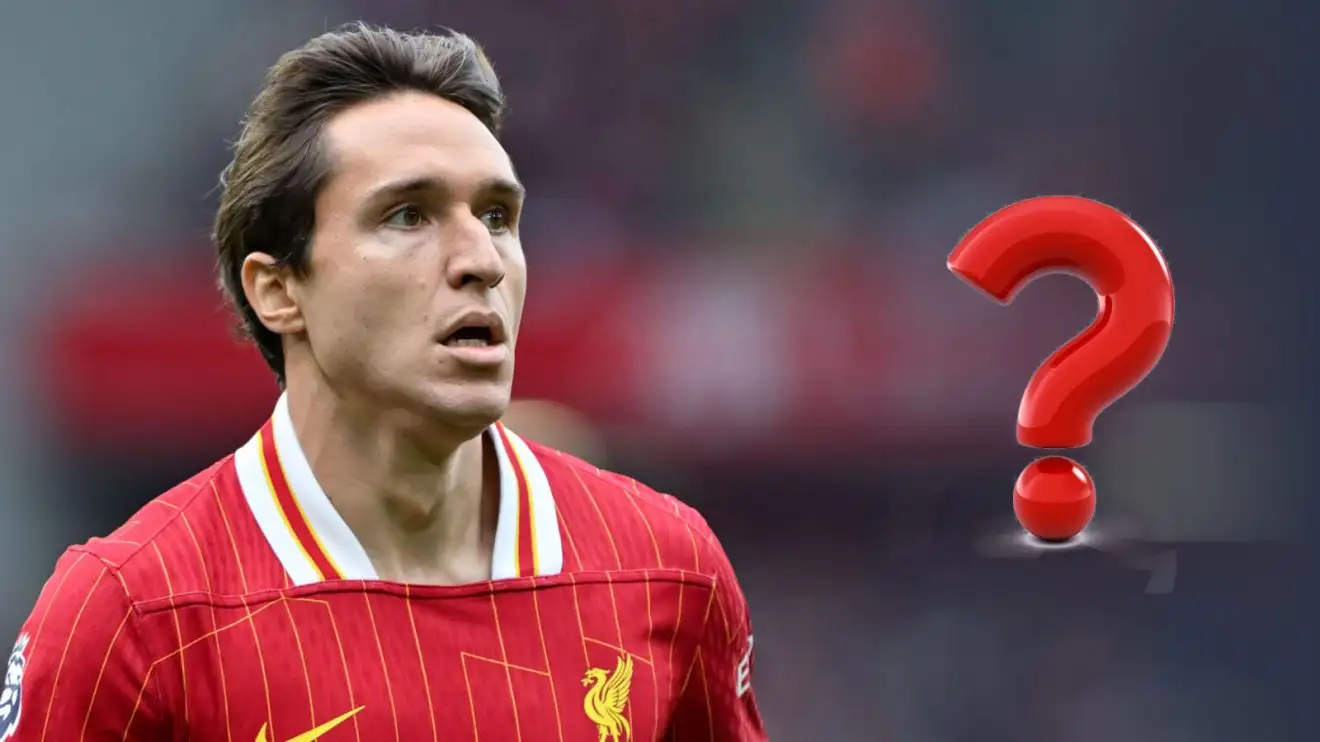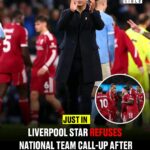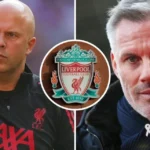Federico Chiesa truth now clear after Liverpool forward makes selection admission

Federico Chiesa’s journey at Liverpool is beginning to unfold in a way few expected. When the Italian winger arrived at Anfield, there was excitement, hope, and belief that his raw pace, dribbling flair, and big-game mentality could reignite Liverpool’s attack. But a few months into his Premier League adventure, his story has taken a different turn—one that mixes brilliance, frustration, and patience. The recent comments from Italy boss Gennaro Gattuso have brought a new light to Chiesa’s situation, painting a clear picture of a player who is eager to give his best but refuses to settle for anything less than full fitness.
Gattuso, speaking openly about the Liverpool forward, revealed that Chiesa made it clear he does not want to return to international duty until he feels completely ready—physically and mentally. It was a bold statement, one that immediately caught attention across Italy and England. The 27-year-old, who has battled with injuries for much of the past two years, wants to ensure he comes back at 100%, not just to play, but to dominate. Despite Italy suffering from a shortage of attacking players, Chiesa was once again absent from the squad for their upcoming World Cup qualifiers against Estonia and Israel.
For some, this might look like a missed opportunity. But for Chiesa, it’s a calculated decision rooted in self-awareness. Since joining Liverpool, he has been trying to rediscover the explosive rhythm that once made him one of Europe’s most feared wingers. He has shown glimpses of that old magic—two goals in five substitute Premier League appearances, and two assists in his only start, a League Cup victory over Southampton. Yet, even those bright moments are layered with frustration, because a minor injury kept him out of the Champions League defeat to Galatasaray, and he then stayed on the bench during the 2-1 loss to Chelsea.
Liverpool fans have been patient, but they can’t help wondering when Chiesa will be truly unleashed. Manager Arne Slot has been cautious with his usage, preferring to protect the player rather than risk another setback. The Reds’ medical staff have been equally careful, mindful of his past knee problems and the physical demands of English football. In truth, Chiesa’s recovery and adaptation have become a balancing act between ambition and caution—a line Liverpool cannot afford to cross.
Gattuso’s words reinforced that same sentiment. “The Chiesa issue is very simple,” he said. “I talk to my players a lot, and I want to make that clear—a lot. I speak every week with Fede and he knows what I think of him, but I also have to respect what the player tells me. He does not feel at 100% and wants to be at 100%. That is the truth.”
Those words captured the entire picture of Federico Chiesa right now. It’s not about form or talent—it’s about fitness, trust, and readiness. The Italian coach’s transparency drew praise from fans who appreciate honesty in football. But behind that honesty lies a deeper message: Chiesa is still fighting his way back to the top, determined not to rush the process.
When Liverpool signed Chiesa, the move was seen as a masterstroke. The Reds needed a spark after losing Trent Alexander-Arnold to Real Madrid and seeing other creative players struggle for consistency. Chiesa’s arrival brought energy, expectation, and a link to a new chapter under Arne Slot. But adaptation to the Premier League is rarely smooth for players coming from Serie A. The tempo, intensity, and physicality of English football can overwhelm even the most talented stars. And for someone coming off long-term injuries, the transition can be brutal.
That’s where Chiesa’s story becomes human. It’s not just about numbers or performances—it’s about resilience. He knows what it means to be sidelined, to sit on the bench while the world expects you to perform miracles. His two goals so far have shown flashes of his finishing touch, but he is still waiting for that breakout moment where he can run freely, dribble past defenders, and celebrate with confidence rather than relief.
In training, Liverpool staff have noticed Chiesa’s commitment. He stays behind after sessions, working on his balance and acceleration. Teammates have spoken about his quiet determination—he’s not one to complain, even when he’s not playing. Mohamed Salah, who has shared similar experiences of criticism and pressure, has reportedly taken Chiesa under his wing, offering guidance on how to handle the spotlight at Anfield.
The chemistry between them is growing. Salah, the veteran forward, knows that Chiesa’s success could help Liverpool’s attack become unpredictable again. Both men love cutting in from wide positions, both thrive on speed and creativity. But right now, Chiesa is watching more than he’s playing, learning from Salah’s composure and tactical discipline.
For Italy, his absence is deeply felt. Gattuso would love to have him available, especially with the national team going through a rebuild. Yet, the coach respects Chiesa’s honesty. “He wants to be at his best when he plays for Italy,” Gattuso said. “He is not a player who wants to wear the shirt if he cannot give everything. And I respect that completely.”
Liverpool fans might find comfort in those words, because they show Chiesa’s priorities are in the right place. He wants to succeed at club level first—to prove to Slot that he can be trusted to start big matches. It’s a mentality that fits well with the club’s values. Liverpool has always admired players who show heart, discipline, and humility before glory.
The question many are asking now is: when will the real Federico Chiesa appear? Arne Slot has hinted that the winger’s time will come soon, possibly after the international break, when he’s expected to be fully fit. Liverpool’s next run of fixtures includes important Premier League games and a must-win Champions League tie, and Slot knows that having Chiesa firing again could change everything.
Fans have already begun to imagine what a fully fit Chiesa could bring. His ability to drive forward from the wings, his fearless attitude in one-on-one situations, and his eye for goal could give Liverpool the edge they’ve been missing. In Italy, he was famous for his bursts of energy, his never-say-die runs, and his knack for scoring in big moments—like the ones that helped Italy win Euro 2020. Those qualities are still there, waiting to explode again under the Anfield lights.
But there’s also a personal side to this story. Chiesa’s journey has been shaped by setbacks. After suffering a major knee injury at Juventus, many doubted whether he could ever regain his full sharpness. Even after his return, critics said he had lost his acceleration, his explosiveness. Yet here he is, at Liverpool, proving that his spirit is unbreakable.
Every substitute appearance is another small step toward redemption. Every minute on the pitch is a statement that he refuses to give up. His family, especially his father Enrico Chiesa, who was also a professional footballer, has been his biggest supporter. Enrico often reminds him that patience is part of greatness—that sometimes the best players are the ones who rebuild themselves quietly before they shine again.
That’s why Chiesa’s decision to stay away from the Italy squad for now isn’t a sign of weakness—it’s a sign of maturity. He understands his body better than anyone. He wants to serve both his club and his country, but not half-ready. He knows that when he’s back at full capacity, he can be one of the most dangerous players in the world again.
At Liverpool, there’s also growing understanding among the fans. Many now see that his slow start isn’t failure—it’s recovery. They’ve seen this before with other stars. Virgil van Dijk took months to regain his dominance after a serious injury. Diogo Jota had spells where fitness stopped him from showing his true quality. The same patience is now being extended to Chiesa.
The wider football world is watching, too. Italian media continue to debate his situation, with some accusing Gattuso of being too cautious, and others praising him for respecting Chiesa’s wishes. But at Anfield, the atmosphere is one of quiet belief. Everyone knows what this player can do when he’s right.
In the dressing room, teammates describe Chiesa as humble and funny, someone who loves the game deeply. He has quickly adapted to the Liverpool culture—singing his initiation song, bonding with younger players, and even staying late at Melwood to perfect his English. Behind the scenes, Arne Slot has been impressed by his professionalism and patience. “He’s a top player,” the manager said in a recent interview. “We just need to make sure we bring him back in the right way. When he’s ready, everyone will see why we signed him.”
The story of Federico Chiesa at Liverpool is still being written. The early chapters may not be filled with goals or trophies, but they are rich with resilience and self-awareness. He is a player who understands that greatness is not always about instant success—it’s about the courage to build again after falling, to wait until your body and mind are in perfect harmony.
Sooner or later, that moment will come. The day Chiesa starts a big Premier League match at Anfield, running down the right flank with confidence, the roar of the crowd behind him, will feel like a comeback not just for a footballer—but for a fighter who refused to give up on himself.
For now, the truth about Federico Chiesa is simple. He’s not broken, he’s rebuilding. He’s not fading, he’s waiting. And when that wait ends, both Liverpool and Italy could find themselves with a rejuvenated star ready to light up the game once again.
That is why Gennaro Gattuso’s calm words mattered. “He wants to be 100%, and that is the truth,” the Italy boss said. In those few words lies the heart of Chiesa’s journey—a reminder that the best stories in football aren’t the ones that rush to glory, but the ones that fight through pain, doubt, and time to get there.















